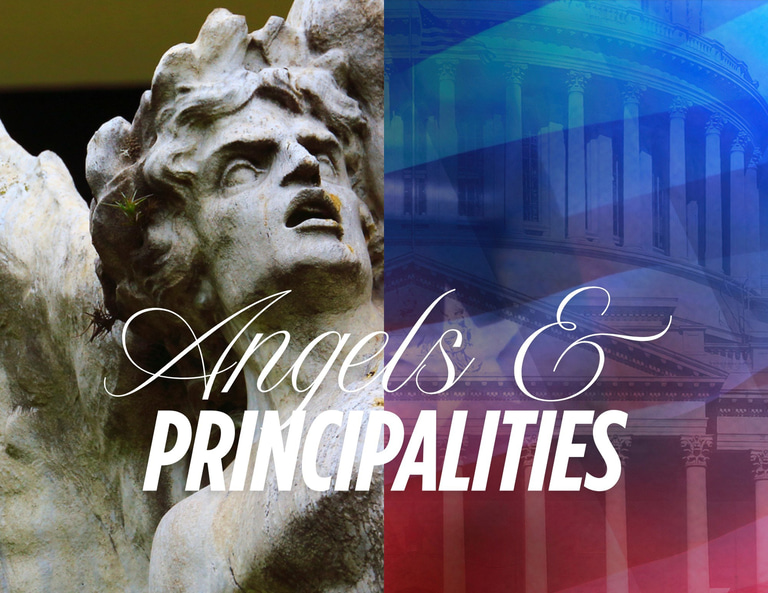Frank DuNN: Conversations at the junction of faith and politics
How Permeable Can Our Boundaries Be?
A big challenge is to keep healthy boundaries, including being emphatic about our values, without becoming defensive when others attack. Is it possible?
Frank Dunn
10/7/20244 min read
A wonderful colleague early in my career once described my preaching as playing the trumpet and his as playing the violin. I laughed. And I agreed.
My tendency—or habit—has been to be declarative, sharp, emphatic, outspoken. As I've grown older, I've been on a path trying to learn to be more flexible when I'm confronted by people expressing opinions different from mine. I still find my breathing growing shallower and my nerves on edge when someone is challenging a position I'm committed to.
This is my personal struggle, not necessarily yours. But I think most of us, regardless of personality, have difficulty knowing how to respond to people who hold opinions and positions that seem odious to us. I think it's no more or less an issue whether we're leftist, rightist, or centrist.
I wouldn't be writing and you wouldn't be reading this blog if we weren't concerned about the work of integrating our faith with other parts of our lives. What is faith if not a way of life? I can't discern the difference between faith that doesn't at least try to express itself in the daily choice one makes, and hypocrisy. Living our faith necessitates being able to find our center, to ground ourselves, knowing what we believe—or don't believe—and why.
If you're paying attention, you know that a whole lot of the division we're experiencing in American society results from seeds deliberately sown by peddlers of disinformation. I'm not talking about misinformation‚ which, though wrong, is not necessarily spread with malicious intent. I'm talking about whole machines, indeed whole national policies of spreading falsehoods for the clear purpose of creating confusion, exhaustion, and ultimately resignation—just giving up. Russian groups with the blessing if not the outright imprimatur of the current Russian government are said to be responsible for a huge number of fake accounts on social media that are key spreaders of disinformation. China and Iran are not far behind, if at all. Perhaps there are others. Don't ask me, "What about all the lies that have been spread by US sources?" I'm not singling out culprits to blame for this, but rather pointing to the bald truth that we are not now dealing with opinions as if opposing points of view were sports teams slugging it out in a game in which all players know and are regulated by rules. No. We are besieged by people who lie for all kinds of reasons, mostly to protect themselves or to achieve their own ambitions to power.
A terrible—and terrifying—case in point is the onslaught of deliberate lies about the rescue efforts of FEMA to the horrific tragedy of Hurricane Helene. People with big megaphones like Donald Trump and Elon Musk have willingly and knowingly passed on incendiary accusations that have no basis in reality. Trustworthy sources like people we know in the affected areas, indeed the governors of States affected have expressed thanks and admiration for the preparedness, responsiveness, and care exercised by the federal government.
In another post soon I'll share with you some of the sources I trust, inviting you to do the same. Suffice it to say that, although I do not footnote every point I make, I do read and trust those who do document their sources.
My boundaries can be permeable enough for me to listen to heartfelt value statements from others, not having to agree or to disagree. I can choose to ask questions instead of arguing. I can choose to invite another to tell me what lies behind their positions, what has shaped them, and—most importantly—what they want to happen, what result they wish for or need to see.
My boundaries, however, cannot be so flexible that I shrink from making my own witness to what I believe to be true, what I believe to be necessary, and what I believe to be appropriate. What I know about witnessing to one's faith is that it is far more important to live it than to talk about it. The oft-quoted line attributed to St. Francis applies: "Preach the gospel at all times. If necessary, use words." I learned late in the game that if I wanted to be helpful in training a newbie in ordained ministry, for example, the best approach was asking good questions rather than being didactic out of my own experiences. Simple, but sometimes hard for me to do. Thus, faced with a statement, a point of view, or even a question that gives me an opportunity to respond, I can choose not to give a counter-view, a rebuttal, or an answer. Sometimes it's effective to respond with a statement such as "I'm wondering what I could tell you that would be most helpful." Or a question such as "Before I respond, could you tell me why this [question, issue, or conversation] is important to you?"
I don't mean these to be cookie-cutter faux-solutions for defusing an argument, but rather examples of how to dial down the temperature without sacrificing, hiding, or being coy about what we really believe. Normally, my experience is that if I'm open to hearing what someone is telling me, they're more likely to hear and respect what I have to say.
There are times of course when someone is so closed-minded that all of this is an exercise in futility. If this proves to be the case, I try to remember two things. One, I'm not charged with fixing (or trashing) closed minds. Two, I only poison myself if I absorb toxicity and anger, ignorance or fear from someone else, inviting those things to have rent-free occupancy in my own heart and mind.
